The unique Italian culture is inextricably linked to the development of the Italian language. It is the language of Dante and Petrarch, opera and Machiavelli's "Sovereign" - with such beautiful words and succinct expressions were created works that have not lost their relevance over the centuries.
The philosophy of life of Italians finds its expression in melodious words and sensuous phrases, the beauty and meaning of which can be understood not only by native speakers. Certain expressions or phrases can be applied to our lives, breathing new life into already familiar meanings.
Bello
Beautiful
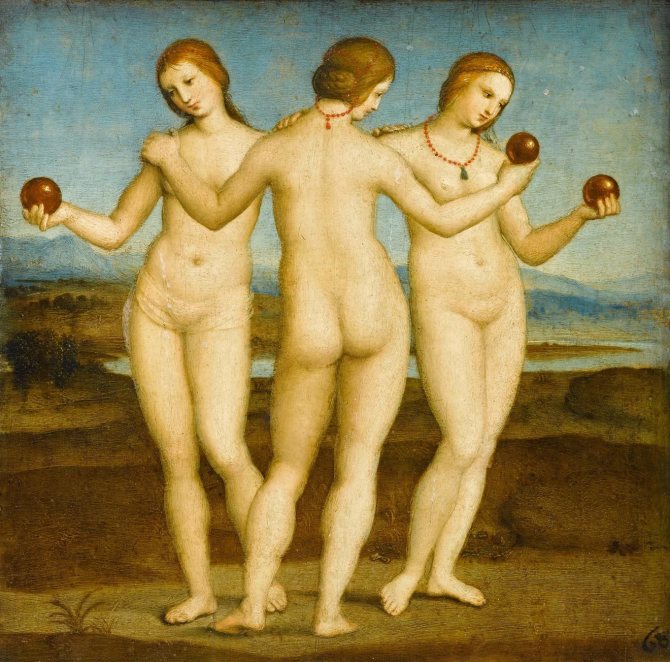
Raphael Santi. The Three Graces. 1504-1505 Musée Condé
The Italian word bello ("beautiful") is familiar even to those who do not speak Italian. Ciao, bella! ("Hello, beautiful!"), depending on the context and intonation, can be both a common friendly greeting and an annoying attempt to get acquainted in the street. In Italian, unlike other languages, the word "beautiful" does not just mean something that pleases the eye. It is this adjective (rather than buono, "good") that Italians use to praise the weather, a book, a play, a movie, and more. Bello can refer not only to a person's appearance, but also to his or her inner qualities. È una bella persona means "He is a good man." It is probably no coincidence that Italians - people who grew up and live among unimaginably beautiful nature and architecture - tend to evaluate a lot of things aesthetically. Bel paese or even Belpaese in Italian is not an abstract beautiful country, but a common paraphrase of the name of Italy, which can be found already in Dante and Petrarch: "A beautiful land where sì is heard" by Dante. The Divine Comedy. Inferno. XXXIII song. Translation by Michael Lozinski, Petrarch, "The beautiful land shall hear your name". Canzoniere. Sonnet CXLVI. Translated by Evgeny Solonovich. This title is still used today, often with bitter irony, especially when it comes to politics and corruption.
Ideas for the name of a beauty salon
Choosing a name for a beauty salon, you need to keep in mind that with this word in the future will be associated with the entire business and the quality of services provided in it. It should be easy to remember and not contradict the range of services provided by the salon. For example, to call a studio that does only manicures, "Lokon" will give the wrong impression on customers.
The name should reflect the idea of the business, easy to remember and like the representatives of the target audience. If a beauty salon provides haircut, manicure or makeup services for women, it is better not to call the salon female names, such as "Maria", "Victoria" and others, as names that include the names of other women, as a rule, do not like women.
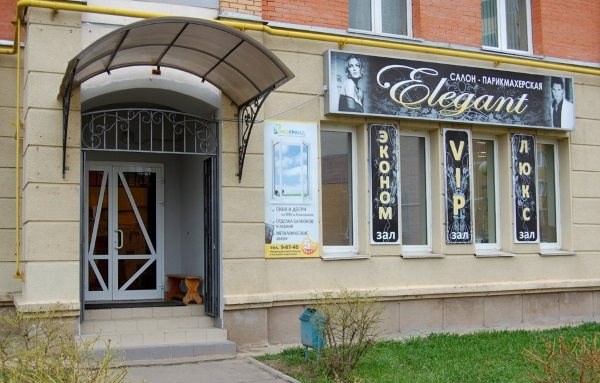

And the names in Italian, on the contrary, cause positive associations with the fair sex.
With the use of Italian words in the name you can denote the use of Italian techniques or materials in the salon, reflect the Italian style of work, with its inherent friendliness and hospitality, or denote a high, "podium" level of service, because Milan is one of the world fashion capitals.
Amazzacaffé
Alcohol drunk after coffee; literally, "coffee killer."
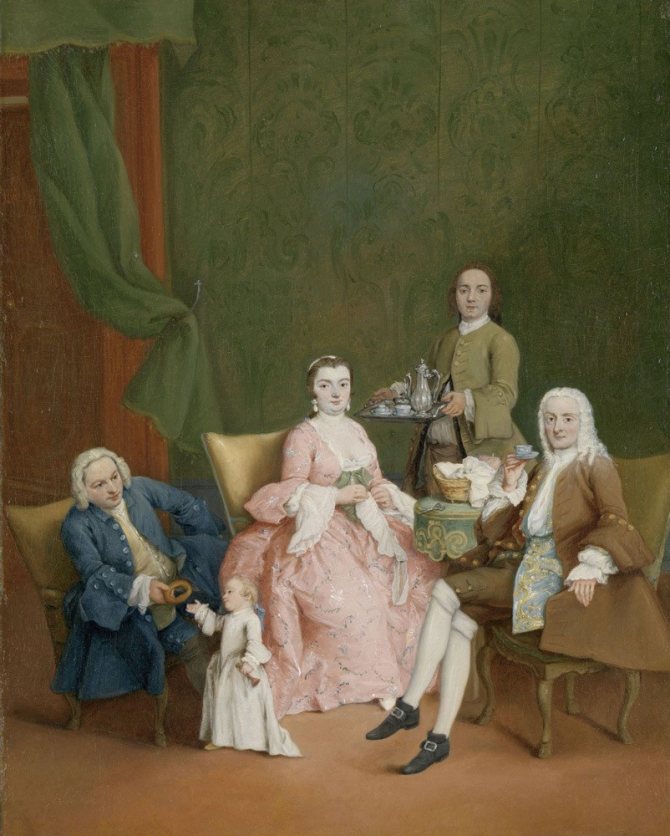

Pietro Longi. A Venetian family with a servant serving coffee. 1752 Rijksmuseum
Italians believe that alcohol kills coffee, at least softens the last bitter note, and most importantly, it weakens the effects of caffeine, which allows one to fall asleep even after drinking a cup of espresso after dinner, besides the combination of coffee and a strong, better bitter liqueur promotes good digestion. This is why amazzacaffé is served after coffee to complete the meal. It could be a glass of sambuca, grappa, bitter liqueur or limoncello. In some places, in and around Vicenza for example, alcohol is poured directly into the cup from the coffee just drunk, locally called resentin - "rinse".
The relationship between Italians and coffee is a separate story. Cartoonist Bruno Bozzetto even has such a story in a cartoon about the Italian national character. Firstly, Italians believe that their coffee is the best in the world and the most correct. Neapolitan students, when they come to Moscow for an internship, bring with them not only a packet of Kimbo coffee and their tried-and-true geyser coffee maker (moku), but also a large bottle of water from the Neapolitan waterworks, otherwise it turns out wrong.
Second, they drink it at any time of day in many variations, but the choice of drink must obey ironclad rules. Cappuccino - only in the morning, and if not in the morning, then Morocchino (the same coffee with a thick milk foam, but in a glass cup). After a meal, it's either normale, which is "normal" espresso, or corretto, which is "tweaked. The coffee can be "corrected" with grappa or, say, cognac. "Tweaked" coffee is drunk when there is little time or a headache, while "killing" ammazzacaffé coffee is usually a long and enjoyable way to stretch out a long dinner for another half hour. The non-strength coffee, which in our country is called Americano, in northern Italy was called German coffee until recently. From coffee to milk there is a scale of drinks: caffè (just coffee) - caffè macchiato (a cup of coffee with a spoon of milk) - caffellatte (in half, most often drunk by children and old ladies) - latte macchiato (a cup of milk with a spoon of coffee) - latte (just milk). In general, coffee accompanies a person from morning to evening all his life - and even a person with cardiovascular diseases: decaf or barley, but in the same dilutions: normale, macchiato, corretto...
Apericena
Aperitif to replace dinner.
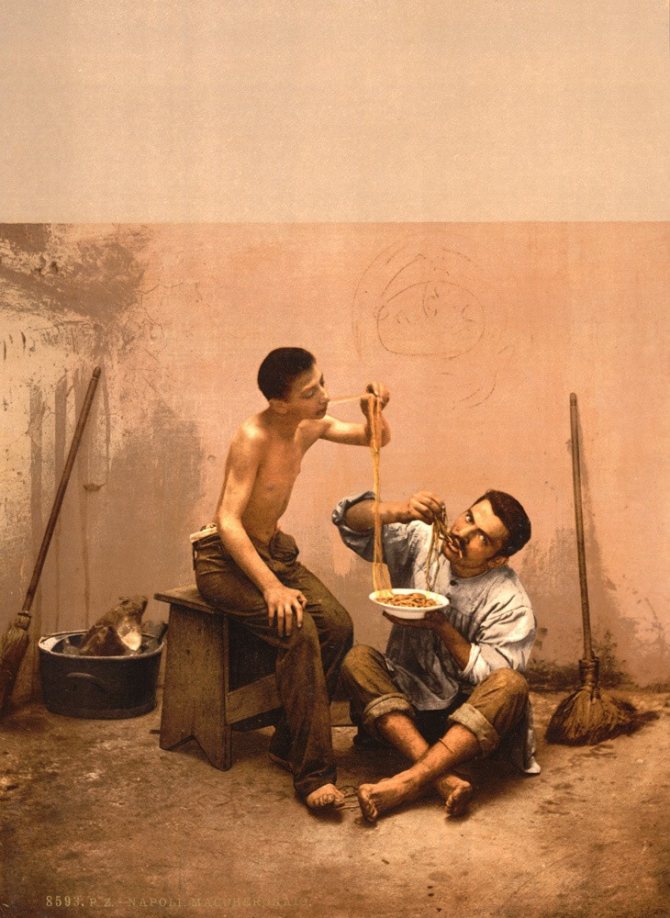

Pasta vendors. Naples, 1890s. The Library of Congress.
Everything to do with food (which is a fundamental part of Italian culture) is governed by rules. Italians eat strictly according to a schedule: breakfast before work - coffee and something sweet, lunch just after noon, dinner around eight, and in the south of Italy, especially in summer, later - at nine or even ten pm, when the heat subsides. A person who visits at the wrong time, in most cases, can only count on a coffee, and restaurant kitchens between lunch and dinner remain open only in the most touristy places. Aperitifs are defined as going to a bar from about six to eight when, in addition to a glass of wine or cocktail, you are also given a free dish with nuts, chips or olives - in short, a little snack. In recent years, this tradition has evolved. Apericena (from aperitivo, "aperitivo", and cena, "dinner") is a revolutionary fashion that emerged in the early twenties in northern Italy and is gradually gaining momentum, especially among young people. Aperichena is much more dense than the traditional aperitif, essentially replacing dinner. However, apericena differs from dinner in that it starts earlier and consists of appetizers (small pizzas, sandwiches, etc.), which are most often eaten with hands. Young Italians are very fond of the neologism apericena and widely use it, but the older people and the guardians of tradition are displeased with the new phenomenon.
Magnifico
Magnifico
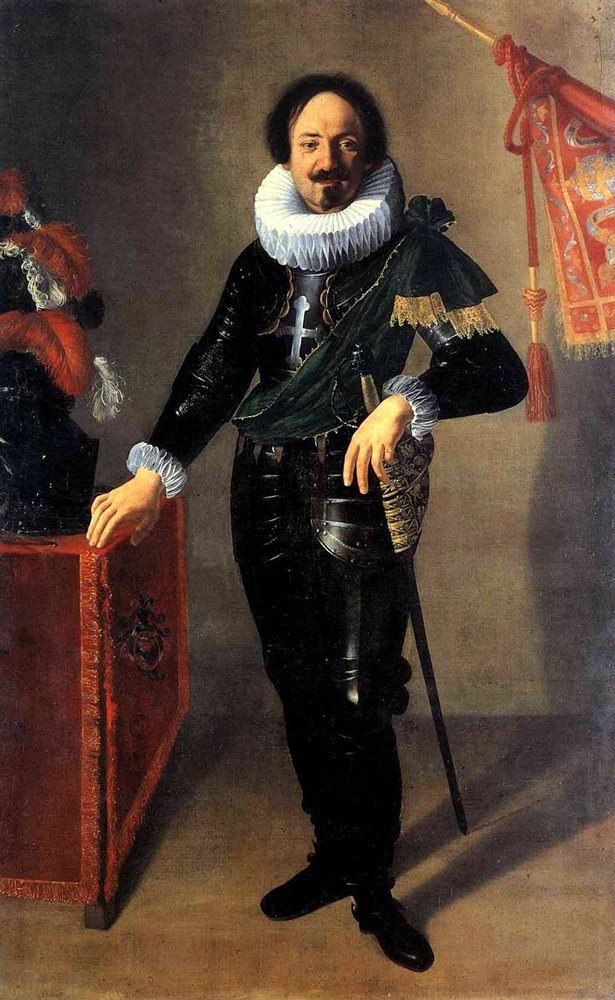

Artemisia Gentileschi. Portrait of Gonfaloniere. 1622 Collezioni comunali d'arte / Istituzione Bologna Musei
The word "magnificent" is also in Russian. But now imagine that you use it not to describe something good, but when you address someone: "Oh magnificent". Who would you address that to? Unless it was Lorenzo de Medici. And Italians would address any rector of any university as such, and not during the Renaissance, but now, in the twenty-first century. Not "respected," not "honorable," not "gracious," but "magnificent"-and only so. In recent decades, the formalities are gradually coming to naught, and even the Italians of advanced age are happy to switch to "you" with everyone. But the love and attention to titles is slowly disappearing from the Italian collective consciousness: on door signs, on letters and telegrams, in official documents they still proudly write "engineer", "lawyer", "accountant". Once you graduate from university, you are already a dottore/dottoressa. If you teach at least in high school, you are a professore/professoressa. And in elementary school or kindergarten it's maestro/maestra, also very solemn. If you have to send a letter to a professor, he is "outstanding", to a common man he is "amiable", to any deputy he is "worthy", and if someone has been awarded a medal or an order, he is at once "knight", that is "knight". It's amazing when you ask if Mr. Rossi lives here and you get a stern answer: no, Mr. Rossi doesn't live here, only Rossi's lawyer. Or on the phone: "Hello, are you so-and-so?" - "No, I'm gentleman so-and-so!" These days, as the Italian language is rapidly becoming polluted, the combination of the ubiquitous almost familial "you" and all this ceremonial titularity often looks ridiculous.
Proverbs and sayings
In conclusion, I would like to bring to your attention proverbs and sayings which are an integral part of folklore and which we also use in conversation.
Dimmi con chi vai e ti dirò chi sei. Tell me who your friend is and I will tell you who you are.
Dio ama parlare con chi ama tacere. God likes to talk to those who keep silent.
Il mondo è fatto a scale, c'è chi scende e c'è chi sale. The world is like a ladder? Some go up and some go down.
Il lupo perde il pelo ma non il vizio. The wolf loses his skin, but not his vice.
Meglio tardi che mai. Better late than never.
Occhio per occhio, dente per dente. An eye for an eye, a tooth for a tooth.
Ride bene chi ride ultimo. He who laughs last laughs.
Tra il dire e il fare c'è di mezzo il mare. Between talking and doing, the sea (the great distance).
Vive bene chi prende il mondo come viene. He who accepts the world as it is, lives well.


Il lupo perde il pelo ma non il vizio. canelupocecoslovacco.net
Papabile
Probable winner, favorite; in the first sense, "a cardinal who has a chance of being elected pope."
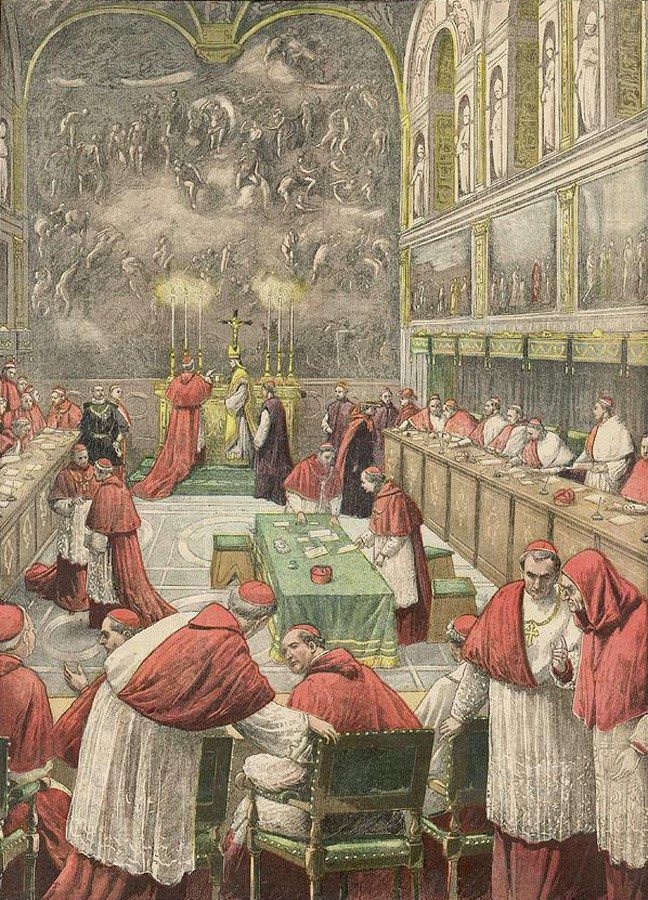

Papal Conclave. Illustration from Le Petit Journal of August 9, 1903.History Collection.
This funny adjective has entered many languages, including Russian; there is even such an article in Wikipedia, and "papabile" is a noun in it. Church political scientists have used it quite extensively, especially in this century, because in the past few years a pope has already been elected twice: in 2005, after the death of Pope John Paul II, and in 2013, after the abdication and retirement of Pope Benedict XVI. The whole world followed these elections. In Italian, papabile is not only used to refer to cardinals aspiring to become pope. It is also used to refer to politicians before elections, and to soccer players discussing a possible transfer, and even to cities competing for the right to host the Olympics or a stage of bicycle race "Giro d'Italia".
Ricambiare
To thank, to repay, to return the favor.
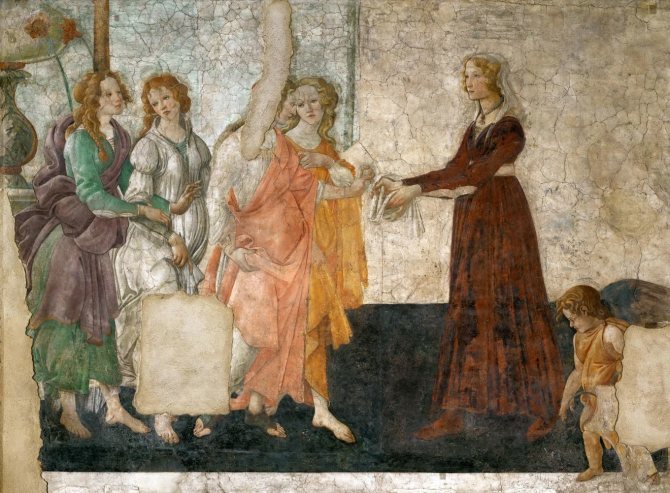

Sandro Botticelli. Young woman receiving gifts from Venus and the three Graces. 1486-1490 Musée du Louvre
The verb ricambiare is not always easy to translate into Russian. It can refer to a smile (ricambiare il sorriso - "to return a smile with a smile"), to a visit (ricambiare la visita - "to return a visit"), to help or a favor (ricambiare la cortesia - "to return a favor with a favor"). Ricambiare can be used when it is a greeting, an invitation to visit, or even an insulting word. It is also spoken of mutual friendship, love or hatred.
Italians do not like to stay in debt and try to even the score as quickly as possible. A person, brought up in Russian culture, may find it difficult to get used to the straightforward and immediate expression of gratitude accepted in Italy (for example, to give a scarf immediately in response to help with translation).
Tattoos in Italian
Italian is less common than English, for example, so not everyone will be able to immediately guess what the phrase written on the tattoo is about. As a rule, the phrase and font each person chooses for themselves individually, but there are several fairly universal options if it is difficult to decide for yourself.
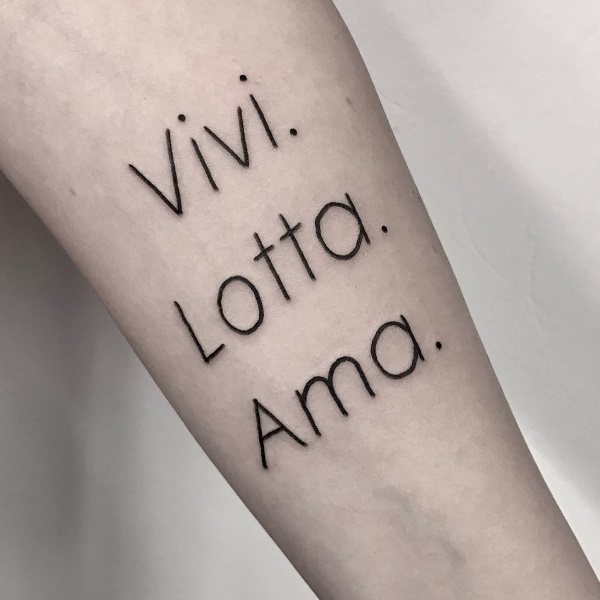

| Phrase in Italian | Translation from | |
| Prendi una decisione e agire | Make a decision and act | |
| La vita è un momento | Life is a moment | |
| Amore mio | My love | |
| poesia di momento | Poetry of moments | |
| Iil cuore è stato | Heart-stopping | |
| Ogni decisione conduce da qualche parte | Every decision leads somewhere | |
| Per amore | For love | |
| Vivi. Lotta. Ama. | Live. Fight. Love. | |
Trinariciuto
A brainwashed man who does not think with his head; literally, "the man with three nostrils."
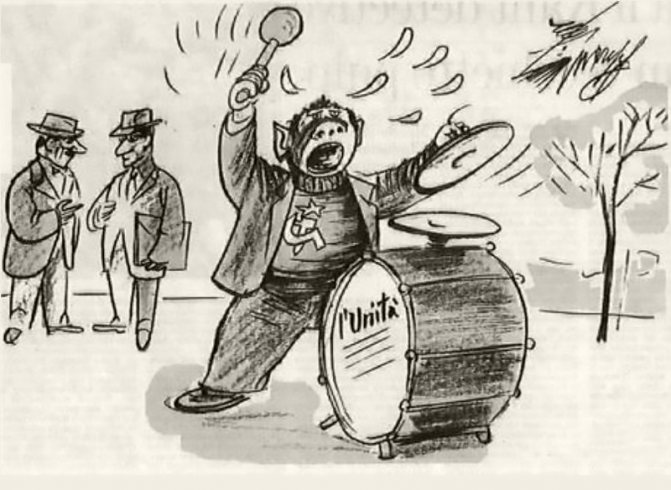

Caricature by Giovannino Guareschi in Candido Magazine dated April 19, 1959. © RCS MediaGroup S.p.A.
This is not a genetic mutation or a consequence of some complicated otolaryngological operation. The man with the three nostrils is one who follows first and foremost the instructions of the party, not his conscience. A third nostril is needed to free the head from one's own brain and fill the empty space with Party directives. This word appeared in the heat of the post-war political struggle. The first elections, after the end of the fascist regime, the war, the occupation, the regime change, when Italy changed from a monarchy to a republic, in 1948 were to determine the further development of the state: Will Italy become a socialist bloc country (some feared another republic of the USSR) or accept the Marshall Plan. The Communist Party of Italy was extremely popular at the time, and it was the only party in Italy with strict, almost military discipline and rigid vertical control. And it was the Communists who were portrayed in the political-satirical newspaper Candido in Milan with three nostrils, doing all kinds of ridiculous and insane things for the sake of "blind, instant and absolute obedience". More than seventy years later, the Communist Party of Italy no longer exists, but the word trinariciuto is still actively used in political discourse, and not only by politicians and not only about the left. For example, in an interview shortly before his death, the famous Sicilian writer Andrea Camilleri said of another great Sicilian writer, Leonardo Chacha: "He was a trinariciuto anticommunist!"
Friendship
Phrases about friendship were also among the popular queries. Shall we meet a couple?
Tre angeli proteggono la tua vita: l'amore, la felicita , la fortuna. Ma se tu avessi bisogno del quarto ricordati di me che sono l'amicizia... Three angels protect your life: love, happiness and luck. But if you need a fourth, think of me, your friend.
Gli amici sono come le stelle... anche quando il cielo è coperto dalle nuvole, sai che ci sono. Friends are like stars... even when the sky is covered in clouds, know that they are there.
And here is a little poem:
Passa l'estate passa la vita ma non passa mai il ricordo di una vera amica..
Summer passes, life passes, but the memory of a faithful friend never fades.
Finché abbiamo dei ricordi, il passato dura. Finché abbiamo delle speranze, il futuro ci attende. Finché abbiamo degli amici, il presente vale la pena di essere vissuto. As long as we remember, the past continues. As long as we believe, the future awaits us. As long as we have friends, we want to live.
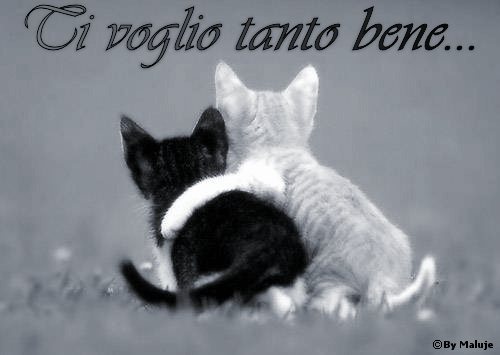

The bright feeling of friendship... Photo monte.wordpress.com
Qualunquista
A man in a state of political apathy, convinced that nothing depends on him
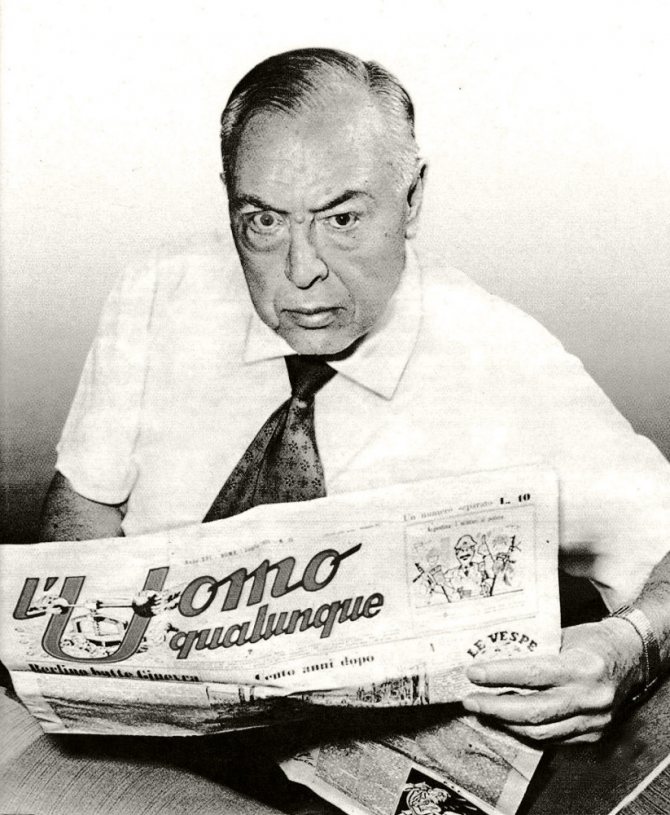

Guglielmo Giannini with the newspaper L'Uomo qualunqueWikimedia Commons
One of the most used terms in political discourse does not lend itself to any adequate translation. The article on this phenomenon (qualunquismo) on Wikipedia is translated in English, German, Croatian and Slovenian as "Political Apathy," but this is a very incomplete translation, and it does not allow a label for someone with such views.
It all started in the mid-forties, when the former comedian Guglielmo Giannini founded first the newspaper L'Uomo qualunque (Just Some Man), then a movement, a party and a front of the same name. The ideology of Giannini and his followers was a general dissatisfaction with everything that was going on, with all existing political forces and the actions of any power, and most importantly, with the need to think about the political course at all. This movement of "angry townspeople" without a positive program was at one time very popular. And throughout subsequent Italian history, it has been revived in one form or another. For example, the "Five Star Movement" in power today was founded by the former comedian Beppe Grillo, and some of its program points are very similar to the demagogic attitudes of the historical qualunquista. It is interesting that this term combines the idea of political indifference with discontent and demagogy. It is a very convenient word.
Recently another term has appeared alongside this one, just as untranslatable benaltrismo. It comes from the expression ben altro, which means something like "quite different. Benaltristi are people who, when any news appears, say, "Why talk about it, the other thing is important.
Quotes from books
It's no secret that quotes from books tell you that your interlocutor is well-read and intelligent. We offer you a couple of phrases from books by famous Italian authors. So when you meet him, you can say, "And remember how he wrote... in his book..." So, a little excursion into modern Italian literature.
Alessandro Barrico was born in 1958 in Turin. Alessandro made his debut in literature in 1991 with the novel Locks of Wrath. The author was awarded the Viareggio Prize for the book "The Sea Ocean". By the way, here are some quotes from that book! ...perché un pretesto per tornare bisogna sempre seminarselo dietro. ...Why you have to keep your excuse to come back inside.
(Alessandro Baricco, Oceano Mare)
Il mare è senza strade, il mare è senza spiegazioni. The sea without roads or explanations.
(Alessandro Baricco, Oceano Mare)
Antonio Tabucchi was born in 1943 in Pisa. He is not only a famous writer whose novels are often adapted into films (Il piccolo naviglio Donna di Porto Pim, Notturno indiano), but also a Portuguese philologist and translator.
Le persone sono lontane quando ci stanno accanto, figurarsi quando sono lontane davvero. People are distant from each other when they are near each other, and pretend to be when they are really strangers.
(Antonio Tabucchi, Si Sta Facendo Sempre Piu' Tardi (Romanzo in forma di lettere)
Come vanno le cose, e cosa le guida: un niente. How things go, and what drives them: nothing.
(Antonio Tabucchi, Si Sta Facendo Sempre Piu' Tardi (Romanzo in forma di lettere)
Fabio Volo was born in 1972. In addition to being a popular writer, Fabio is also a singer, DJ, actor, screenwriter and TV presenter.
Pagina bianca come la vita. Le amo entrambe perché sono curioso di vedere come va a finire. Life is like a white page. I love them both because I wonder how it will all end.
(Fabio Volo, E' una Vita che ti Aspetto)


Books are a source of wisdom. Photo buchstart.ch
Gattara
A lonely old lady, an eccentric old maid who feeds and picks up stray cats


Anna Magnani with cats © Sadie Coles
Next to the Roman Abbey of the Three Fountains, on the site of the death of the Apostle Paul, some years ago gattare (plural of the word gattara) built an entire town for stray cats, and every Christmas they brought there a decorated Christmas tree and presents. This is a typically Roman (and all-Italian) phenomenon.
Gattara (very rarely gattaro in the masculine form) is usually used in Italian in a negative or ironic way, in line with "old maid", "witch", etc. Italian feminists do not like it very much, because the word gattara almost always refers only to women Not for nothing there is a politically correct analogue - gattofilo - simply "cat person, cat lover".
The word gattara can be heard in any part of Italy, but it comes from Rome, and this is no coincidence. Stray cats have long been fond of Roman ruins. Now they have been evicted from the most touristy places (such as the Colosseum or the Roman Forum), but the nearby square of Torre Argentina - the place where Julius Caesar was killed - has become an officially recognized feline colony (colonia felina), one of many, but the most famous in Italy. Volunteers, who care about cats, even on their official website defiantly call themselves exactly gattare and are proud of the fact that the great Italian actress Anna Magnani, who lived nearby, was one of them.
And yet, the stereotype that a gattara is a feisty, unkempt, often crazy old woman who loves cats more than people has taken root in the mass consciousness. There is an opinion that the negative connotation of the word gattara in the Italian language is explained by the social problems that lead to the spread of this phenomenon (first of all, the growing number of single old people, because more and more young people are leaving to study and work far away from home). The consequences of their activities - the remains of cat food in the parks and on the streets of Italian cities, which attract mice, rats and even wild boars - do not add to the sympathy for gattare.
Meriggiare
Relaxing in the hot afternoons in the shade and cool of the trees in the garden
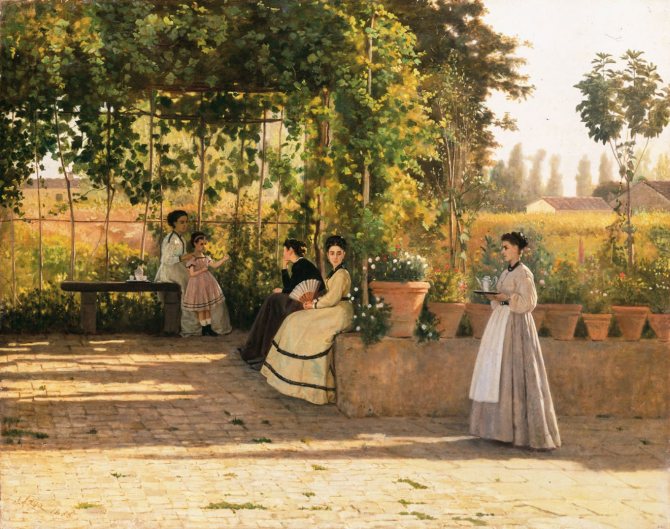

Silvestro Lega. In the afternoon. 1868 Pinacoteca di Brera.
This is not the most common verb all Italians know thanks to the poem "Meriggiare pallido e assorto" by Eugenio Montale. There are several translations of it into Russian: "Plunge into the garden, seeking coolness" (Evgeny Solonovich), "Waiting out the afternoon" (Antonina Kalinina) "Afternoon in the garden, exhausted" (Olga Trubina and J. Beloussi). The translators reveal different components of the meaning of this capacious verb: the need for unity with nature, longing from the heat, noon hours, and loneliness. All together, meriggiare distinguishes it from a simple pisolino-"a light afternoon nap"-or abbiocco-"falling asleep from overeating. Meriggiare is a leisurely, deep process, impossible in a stuffy room or office; it requires the dense shade of a tree, the singing of cicadas and the quivering of heated air.










